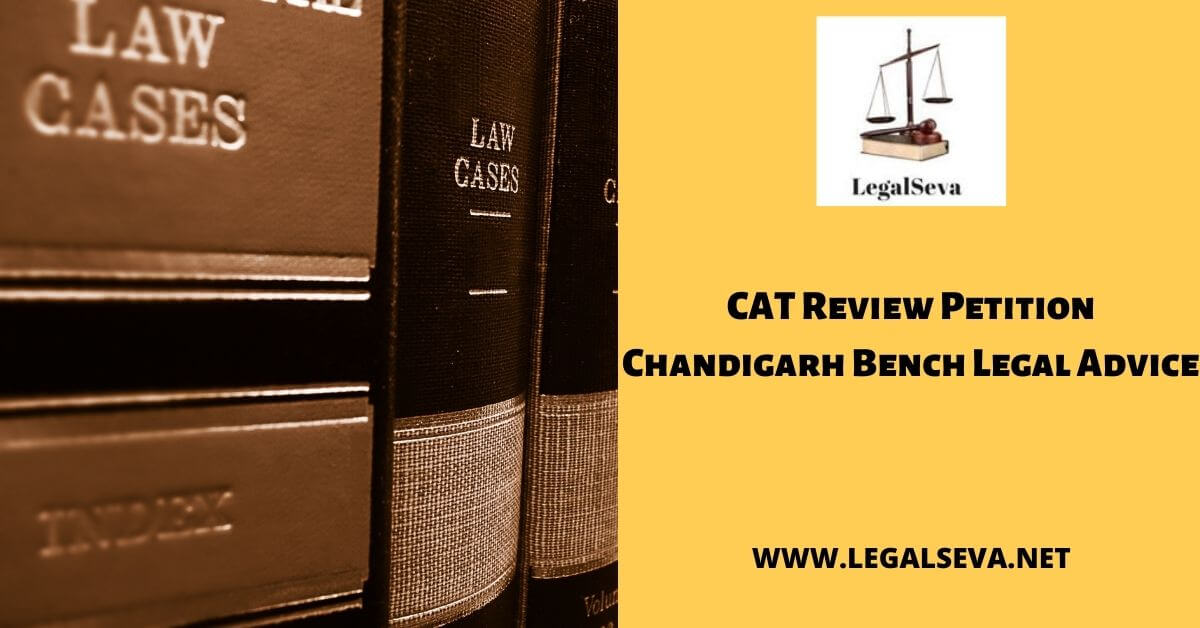Post covers CAT Review Petition Chandigarh Bench Legal Advice. Case decided on basis of STATE OF WEST BENGAL AND OTHERS VS. KAMAL SENGUPTA AND ANOTHER judgment.
Principles of REVIEW Application Before CAT Tribunal Chandigarh
INTRODUCTION
In India, there are three tiers Judiciary i.e. District Courts, High Courts and hon’ble Supreme Court of India. The appeal, review and revision lies in all the three Courts depending on which Court’s Order is being challenged. Therefore, it is necessary to know the nature and scope of all these three words and also how they are different from each other. It is imperative to know the scope of all these to exercise the power of reviewability against the impugned order of the respective Court. Review means to reconsider, to look again or to re-examine. In legal sense, it is a judicial re-examination of the case by the same court and by the same Judge.
Also Read- Review Application Chandigarh Central Administrative Tribunal
FACTS OF THE CASE:
The applicant filed a review application RA in the Central Administrative Tribunal. The original application was also filed in the tribunal and the claim of the applicant was rejected. After the decision of the court, applicant pleaded to get a review decision.
APPLICANT’S CONTENTIONS
In the R.A., the applicant pleads that competent authority has failed to consider his claim as per various judicial pronouncements. Further, he pleads that another O.A. has been decided by this Tribunal by directing the department to consider payment of medical expenses in view of law laid down in the case of Mohan Lal Gupta.
RESPONDENT’S CONTENTIONS
In the present case, there is no decision whatsoever by the respondents on the claim of the applicant.
Also Read- Free Legal Advice Chandigarh Panchkula Mohali Punjab
FINDINGS OF THE COURT
The applicant is drawing similarity in two cases which are not similar at all. The only ‘order’ brought in the present O.A. was an internal communication between Respondent No.2 and No.3. Even this ‘order’ was by way of ‘remarks’. And in conclusion, there was only an ‘advice’. No communication to the applicant himself from the respondent department was enclosed with the O.A. So, in this case it was rightly concluded that respondents are yet to take a final call on the claim of the applicant.
Also Read- District Courts Chandigarh Panchkula Mohali Derabassi Kharar
CONCLUSION
There is no similarity between these two cases. While in one case decision has been taken by the respondents on the claim of the applicant, it was not so in the present O.A. Needless to mention here that each case has to be examined and decided on the basis of facts involved therein and not in a mechanical manner. Therefore the RA is totaaly misconceived and dismissed.
Jugdements on this topic
In case STATE OF WEST BENGAL AND OTHERS VS. KAMAL SENGUPTA AND ANOTHER (2008) 8 SCC 612, has laid down the principles of review for review of the orders as under :
1.The power of the Tribunal to review its order/decision under Section 22(3)(f) of the Act is akin / analogous to the power of a Civil Court under Section 114 read with Order 47 Rule 1 of CPC.
2.The Tribunal can review its decision on either of the grounds enumerated in Order 47 Rule 1 and not otherwise.
3.The expression ‘any other sufficient reason’ appearing in Order 47 Rule 1 has to be interpreted in the light of other specified grounds.
4.An error which is not self-evident and which can be discovered by a long process of reasoning, cannot be treated as an error apparent on the face of record justifying exercise of power under Section 22(3)(f).
Also Read- Promotion from Pcs/hcs to Ias Through Cat, Tribunal Chandigarh
- An erroneous order/decision cannot be corrected in the guise of exercise of power of review.
- A decision / order cannot be reviewed under Section 22(3)(f) on the basis of subsequent decision / judgment of a coordinate or larger bench of the Tribunal or of a superior Court.
- While considering an application for review, the Tribunal must confine its adjudication with reference to material which was available at the time of initial decision. The happening of some subsequent event or development cannot be taken note of for declaring the initial order/decision as vitiated by an error apparent.
- Mere discovery of new or important matter or evidence is not sufficient ground for review. The party seeking review has also to show that such matter or evidence was not within its knowledge and even after the exercise of due diligence, the same could not be produced before the Court/Tribunal earlier.”
Also Read- Res Judicata in CAT Tribunal Chandigarh Cases
For case specific advice, please contact Chandigarh Administrative Tribunal/Service Matter/Labour and Service/CAT/Legal Aid/Administrative/Senior/Service Employment Lawyers Advocates in Chandigarh Panchkula Mohali Kharar Derabassi Zirakpur etc.
More 99888-17966.

